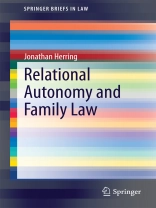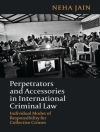This book explores the importance of autonomy in family law. It argues that traditional understandings of autonomy are inappropriate in the family law context and instead recommends the use of relational autonomy. The book starts by explaining how autonomy has historically been understood, before exploring the problems with its use in family law. It then sets out the model of relational autonomy which, it will be argued, is more appropriate in this context. Finally, some examples of practical application are presented. The issues raised and theoretical discussion is relevant to any jurisdiction.
Jadual kandungan
Chapter 1: Introduction.- Chapter 2: The Meaning of Autonomy.- Chapter 3: Family Law and Autonomy.- Chapter 4: Relational Autonomy.- Chapter 5: Applying Relational Autonomy to Family Law.- Chapter 6: Examples of Application.- Chapter 7: Conclusion.
Mengenai Pengarang
Jonathan Herring has written on criminal, family and medical law. He focuses on how the law interacts with the important things in life: not money, companies or insurance; but love, friendship and intimacy. In his work he seeks to develop ways in the law can recognise and value the goods in activities such as care work and sex, while protecting people from the harms that so often result. Criminal Law Jonathan Herring has written two best-selling textbooks on criminal law. He has researched the law on sexual offences, crimes against corpses and failures of parents to protect children from death. Elder Law Jonathan Herring has written a leading monograph on the law’s treatment of older people. He has also published on legal issues surrounding dementia. Family Law Jonathan Herring has written a popular textbook in this subject and has edited several books on theoretical issues in family law. He has examined the way the law balances the interests and rights of children and parents. He has also analyzed legal disputes over contact between children and parents and issues surrounding children’s rights. He is a member of the editorial board for the Family Court Reports and is an editor for the Child and Family Law Quarterly. Medical Law Jonathan Herring has written a leading textbook on this subject. He has written on the regulation of pregnancy and enforced medical treatment. He has also co-authored with Dr P-L Chau a series of papers on the medical and legal definition of sex, with particular consideration of intersex people and issues surrounding human cloning. He has also written on the ownership of body parts and bodily fluids, as part of a project for the Cambridge Socio-Legal Group. He is currently working on legal issues surrounding carers.












